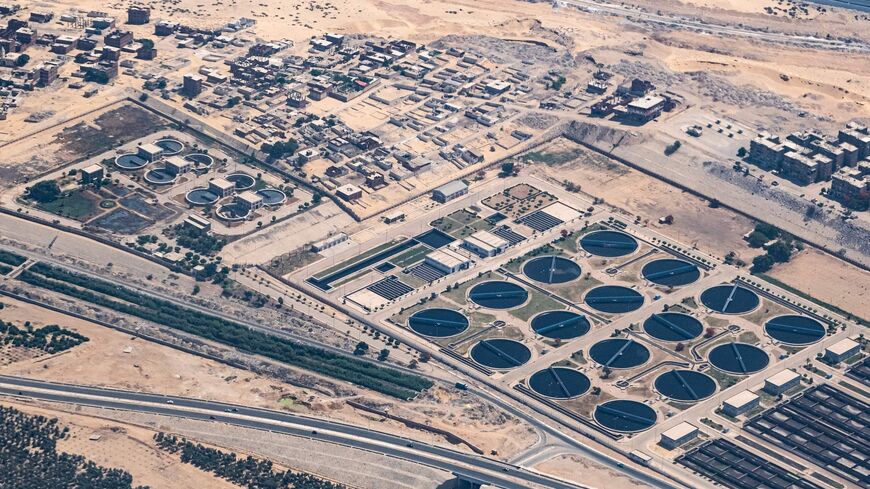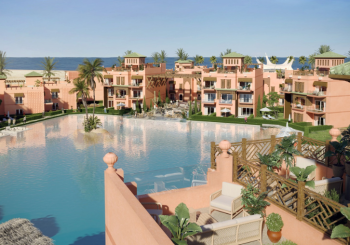Egypt has faced increasing water stress for the past decade. The Nile River, historically a crucial water source for Egypt, now struggles to reach the Mediterranean Sea because of the escalating population demands that have surpassed its capacity.
The stress on the Nile is posing a significant risk of water scarcity for drinking purposes. The situation has been exacerbated with the filling of the Grand Ethiopian Renaissance Dam, which began in 2021.
Egypt’s annual water needs are estimated at around 114 billion cubic meters, according to the Ministry of Water Resources and Irrigation. The majority of the country’s water supply is primarily sourced from the Nile River, with Egypt receiving approximately 55 billion cubic meters annually from the river’s flow.
In recent years, the government has been striving to bridge this gap by expanding seawater desalination projects.
According to the Egyptian Center for Strategic Studies, Egypt has increasingly expanded its desalination plants to become the largest owner of such facilities in the Middle East, with around 100 desalination plants with a capacity of 1.2 million cubic meters per day, according to official data from the Ministry of Housing and Urban Communities.
Egypt’s desalination plant strategy
Egypt is currently implementing a strategic plan for seawater desalination, which includes the introduction of plants with a total capacity of 9 million cubic meters per day by the year 2050. The strategy involves six five-year plans, encompassing the establishment of 21 plants in the first phase, with a total cost of USD3 billion (EGP 140 billion). It targets an increase in daily water production to over three million cubic meters per day, according to a previous statement from Egypt’s Sovereign Fund.
In December 2023, the head of the Central Unit for Public-Private Partnership at the Egyptian Ministry of Finance, Atter Hanoura, told Al-Arabia Business that the Egyptian government aims to operate the first six seawater desalination plants during the fiscal year 2025-2026.
Hanoura estimated the total capacity of these six priority plants to be around 900,000 cubic meters per day, with total investments reaching USD 900 million (EGP 42 billion).
Additional plants in newly-established Ras El Hekma
Additionally, Egypt intends to invite investment bids for the construction of four desalination plants costing USD 350 million (EGP 16.3 billion), with some planned near Ras El Hikma by mid-July, according to Hanoura.
17 consortia have qualified for the tender over the past year and will be notified to obtain the necessary documents. The targeted production capacity of these plants is between 300,000 to 400,000 cubic meters per day of potable water, intended for sites including the Dabaa area and others near Ras El Hikma.
The consortia consist of Gulf, Chinese, European, and Egyptian companies, including major players like Saudi Arabia’s Acwa Power, Orascom Construction, Hassan Allam, Samcrete, and AAW Consulting Engineers.
These projects will be tendered under the Build-Operate-Transfer (BOT) system, part of the government’s efforts to develop the North Coast. Additionally, Egypt signed a contract with ADQ, the Abu Dhabi sovereign investment company, in February 2024, to enhance Ras El Hikma City with USD 35 billion (EGP 1.6 trillion) in foreign direct investments.
Ensuring high quality
In May 2024, the General Authority for Specifications and Quality issued four new specifications in the field of water desalination. The first specification covers operational terms and equipment for desalination plants, the second addresses primary treatment, the third focuses on reverse osmosis, and the fourth outlines technical requirements for concentration treatment in desalination plants using osmotic pressure.
Currently, the Authority is drafting two specifications for final treatment and common issues in desalination plants using osmotic pressure, as well as considering a proposal for specifications necessary for water desalination plants within natural reserves.
Analysts believe that the government’s ambitious desalination initiatives are crucial for securing a sustainable water supply in light of Egypt’s growing water stress
Through strategic investments, robust planning, and adherence to high operational standards, Egypt is poised to significantly mitigate its water scarcity challenges, ensuring a more secure future for its population.







Comments (5)
[…] post Egypt Ramps Up its Desalination Efforts first appeared on Egyptian […]
[…] post Egypt Ramps Up its Desalination Efforts first appeared on Egyptian […]